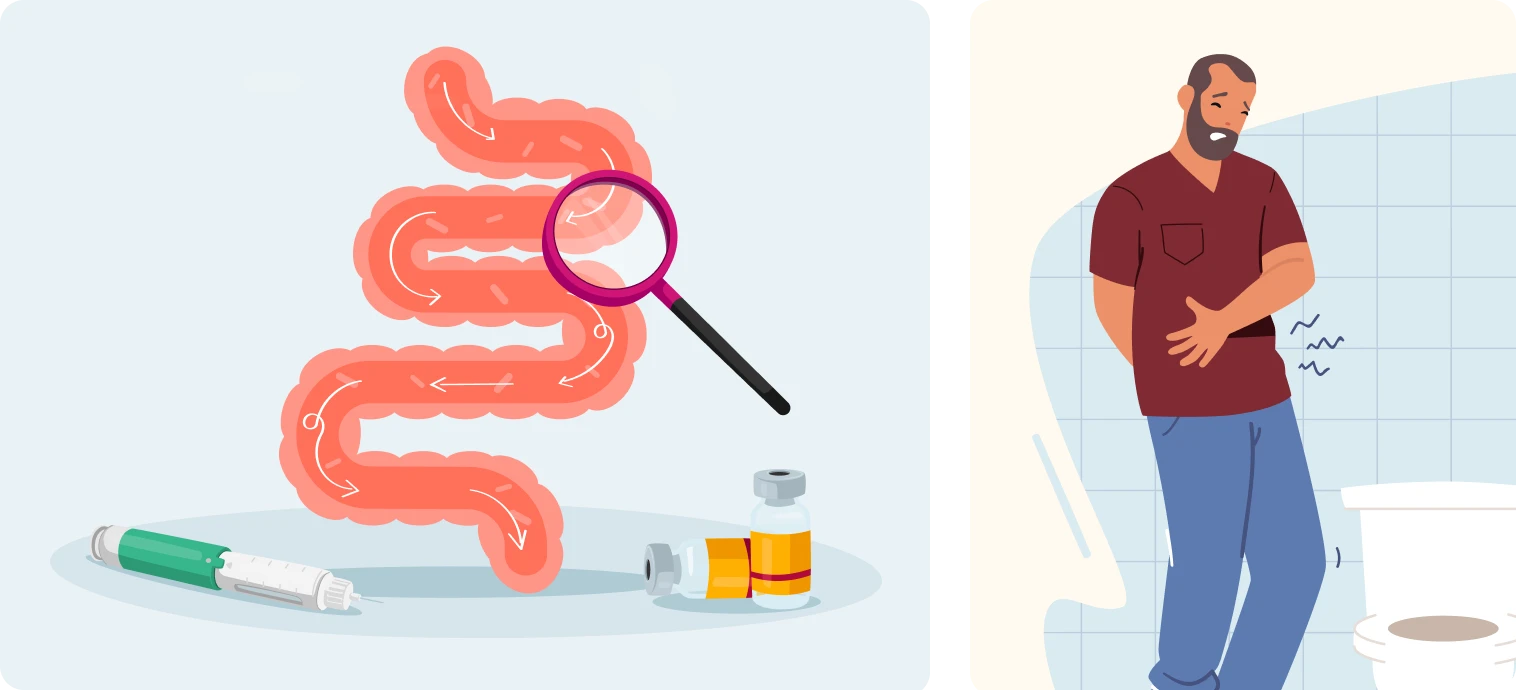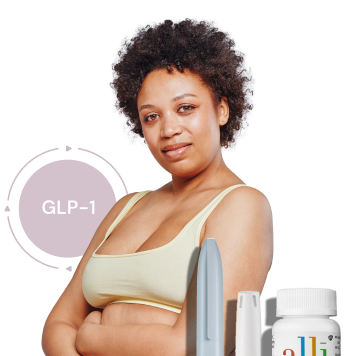Diarrhoea is a common gastrointestinal side effect experienced by many people taking weight management injections such as semaglutide (Wegovy) and tirzepatide (Mounjaro). When it happens, you’ll notice looser stools and more frequent trips to the toilet.
Why does your body react this way? Scientists are still studying the exact causes, but these medications appear to change how your digestive system works. They can alter how quickly food moves through your gut, affect fluid secretion in your intestines and even change the balance of beneficial bacteria in your digestive system.
Knowing this connection helps you better prepare for and manage this side effect during your treatment journey.

Key symptoms
- Loose, watery stools
- Increased frequency of bowel movements
- Urgency to defecate
- Abdominal cramping or pain
- Possible nausea
- Bloating or gas
- Risk of dehydration and electrolyte imbalances if severe
How common is diarrhoea with GLP-1 treatments?
Diarrhoea is one of the more common gastrointestinal side effects, though typically less prevalent than nausea. The risk is generally highest during the initial weeks of treatment and following dose increases, with symptoms often improving as the body adjusts to the medication.
Managing diarrhoea whilst on GLP-1 treatments
Dietary modifications
- Follow the BRAT diet. This is a traditional bland-food diet that are low in fibre and easy to digest (bananas, rice, applesauce, toast) helpful during acute episodes
- Avoid known triggers such as spicy foods, caffeine, alcohol and fatty or fried foods
- Consume soluble fibre sources like oats and psyllium to add bulk to stools
- Eat smaller, more frequent meals rather than large portions
- Stay well-hydrated with water and electrolyte-containing fluids
Supplement approaches
- Consider probiotics specifically formulated for diarrhoea
- Replenish electrolytes lost through diarrhoea with balanced supplements
- Try calcium supplements which may have mild constipating effects (consult healthcare provider first)
- Investigate digestive enzymes if food intolerances are suspected
- Use oral rehydration solutions for significant fluid losses
Lifestyle adjustments
- Identify stress triggers that may worsen symptoms
- Practise stress reduction techniques such as meditation or deep breathing
- Maintain a food diary to identify specific food triggers
- Ensure easy access to toilets when outside the home
- Consider timing activities around predictable bowel patterns
Medical interventions
- Over-the-counter antidiarrhoeal medications like loperamide (Imodium) for temporary relief
- Bismuth subsalicylate (Pepto-Bismol) for mild to moderate symptoms
- Oral rehydration salts (Dioralyte) to replace lost electrolytes and prevent dehydration
- Discuss with your clinician about adjusting your GLP-1 dosing schedule if diarrhoea is severe
- Ask about prescription medications for persistent diarrhoea that impacts quality of life
- Consider temporary dose reduction in consultation with your healthcare provider
When to seek medical advice
Contact your healthcare provider immediately if you experience:
- Diarrhoea lasting more than 2-3 days without improvement
- Signs of dehydration (excessive thirst, dark urine, dizziness)
- Blood or mucus in the stool
- Severe abdominal pain
- Fever above 38°C (100.4°F)
- Symptoms that significantly impact daily activities or quality of life
Long-term outlook
For most patients, diarrhoea is a temporary side effect that improves as the body adjusts to GLP-1 therapy. Most patients reporting diarrhoea experienced significant improvement or resolution 4-8 weeks after treatment initiation, particularly with appropriate dietary modifications and supportive care.
FAQs
Will diarrhoea affect the absorption of my GLP-1 medication?
For injectable GLP-1 medications, diarrhoea generally does not significantly impact absorption since. However, persistent diarrhoea may affect overall health and nutrition.
Can diarrhoea lead to nutrient deficiencies on GLP-1 treatment?
Prolonged or severe diarrhoea could potentially lead to deficiencies in vitamins, minerals, and electrolytes. If diarrhoea persists, discuss nutritional monitoring with your healthcare provider.
Should I stop taking my medication if I experience diarrhoea?
Do not discontinue your medication without consulting your healthcare provider. In most cases, diarrhoea can be managed effectively with dietary changes and supportive treatments.
Is it normal to alternate between diarrhoea and constipation on GLP-1 medications?
Some patients report fluctuations in bowel habits on GLP-1 medications. This may reflect the body’s adjustment to the medication or response to dietary changes. Document these patterns to discuss with your healthcare provider.
How can I distinguish between GLP-1-related diarrhoea and infectious gastroenteritis?
GLP-1-related diarrhoea typically follows a pattern related to injection timing or dose changes and is not usually accompanied by fever. Infectious diarrhoea often includes fever, may affect others around you, and has a more sudden onset. When in doubt, consult your healthcare provider.
Related
- Bloating from GLP-1 Injections
- Constipation from GLP-1 Injections
- Dehydration from GLP-1 Injections
- Diarrhoea from GLP-1 Injections
- Dry Mouth from GLP-1 Injections
- Injectable Weight Loss Treatments (GLP-1)
- Nausea & Vomiting from GLP-1 Injections
- Sulphur Burps from GLP-1 Injections (Mounjaro, Wegovy): How to Manage Them
- Weight Loss





























